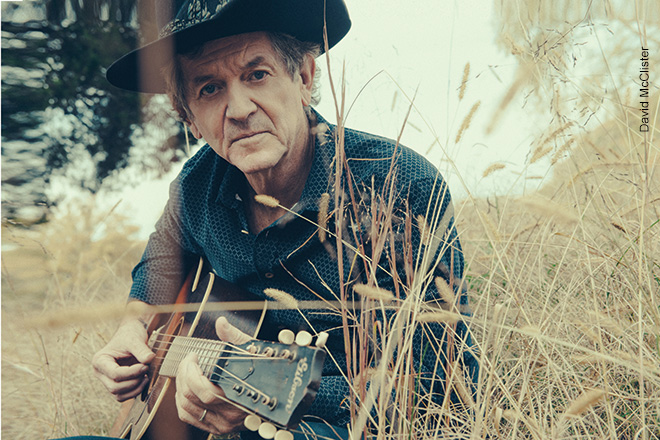RODNEY CROWELL
For the veteran songwriter, patience is the key to creative success
In 2010, Rodney Crowell began the album that would become Tarpaper Sky, recording half a dozen songs before getting sidetracked with other projects: Kin, a collection of songs he wrote with memoirist Mary Karr, and last year’s Grammy-winning Old Yellow Moon, a collaboration with longtime friend Emmylou Harris. “Those beautiful women got my mind off my work,” laughs Crowell. The time away gave the singer-songwriter a fresh perspective—and 36 years after his first release, he’s optimistic about the future. “I’ve started to make headway as a recording artist and performer,” he says. “I feel that I can continue to get better, and that’s exciting for me.”
Did you start with a theme?
We had an idea for a theme going all the way back to the beginning. [Guitarist] Steuart Smith and I talked a lot about landscape paintings, about Cézanne and Van Gogh. All along the process of making Tarpaper Sky we talked about landscape paintings, and lo and behold, the record became a skyscape painting.
How do you write?
None of the songs were written specifically for this album. I don’t write that way—I just make up songs for the sake of making up songs. My mantra for songwriting is, “Be still, be quiet, be patient—and the song will tell you what it wants to be.” I just coax those songs out of hiding. “Fever on the Bayou” lay dormant for 20 years, because I didn’t have the last verse until I got into a conversation with somebody in the airport who said “Franglais.” That Cajun French just stomps on both English and French, and I thought that was what the last verse needed. It was a song that had been around for a long time and that I believed in but could never solve the riddle of the last verse. With “Frankie Please,” I just woke up one day with that line, “You tore through my heart like a tornado looking for a trailer park,” in my head.
Describe the recording process.
To ensure that the musicians and I were in this moment and not back in the ’80s, we got rid of the headphones. Everybody had to play differently. It’s a lot different to play to what you hear cranked up in headphones as opposed to having to listen to a small-body guitar 10 feet away and trying to figure out what the others are doing. About five years ago, I outgrew production forever. All the music that I love, that stands the test of time—Taj Mahal’s “Statesboro Blues” or Howlin’ Wolf’s “How Many More Years” or Ray Charles’ “Hit the Road, Jack”—they’re all performance. Those are not produced records, those are performed records. Hank Williams’ records were not produced, they were performed. Tarpaper Sky is an entirely performed record and I’m proud of that. It’ll be a long time before I reach the level of Ray Charles, but I’m shooting for it as a vocalist.
How have you evolved as an artist?
I became a pretty realized songwriter in my early 20s. I have songs I wrote then that I still perform today to prove that. But I was slow to develop as a recording artist by my criteria. If I had known then what I know now, I’d have been a lot more patient with myself.
What’s next?
Emmylou and I are doing something we didn’t do for Old Yellow Moon—we’re writing songs together. There’s another project, but I don’t want to speak about it and jinx it. But if I can pull it off, it will test my abilities as a recording artist.
–Juli Thanki




comment closed